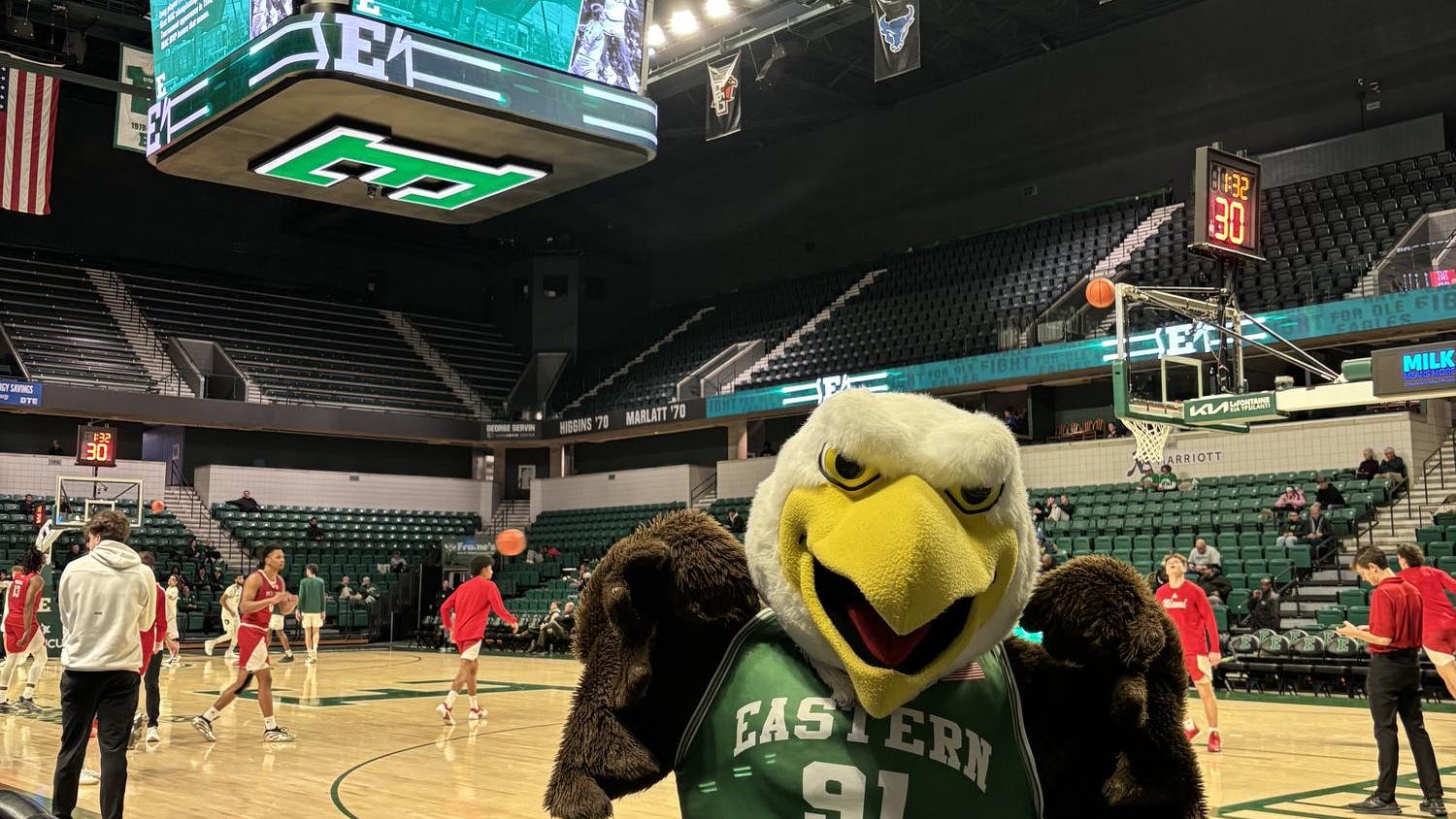Editor's Note: The Eastern Echo staff is meeting regularly with interesting people on and off campus. Engage in those conversations with us through our weekly Q&A report. This week, we talked with Jennifer Kellman Fritz, dean of the university's College of Health and Human Services, and the handler for Tinker, the university's facility dog.
Eastern Michigan University welcomed a first-of-its kind staff member to campus in 2024 — Tinker, a 2-year-old golden retriever trained to support mental well-being and provide comfort to all.
Spearheaded by Dean Jennifer Kellman Fritz, who sought new ways to address student and faculty mental health, Tinker’s arrival marks what Fritz hopes to be a continuing program. Unlike traditional therapy dogs, which typically engage in one-on-one sessions, Fritz said Tinker offers a calming presence to the broader campus. She is available to any student or staff member in need of a moment of comfort.
Fritz collaborated with Paws with a Cause, a disability services and support Michigan-based organization, to bring Tinker to EMU. In this Q&A, Fritz discusses the impact Tinker has had on campus, how EMU got its first facility dog, and how she, too, has benefitted from Tinker’s training.
Q: How did the idea of Eastern having like a therapy dog come up?
A: So, she's a facility dog, not a therapy dog. There is a difference ... because therapy dogs are usually one-on-one with people, and facility dogs are more for everybody. I had the idea because, as a dean, I was trying to think of different ways that we could support students, faculty, everybody's mental health. I did some research and found a place in Michigan where we could get her, and I did a lot of research about the benefits of having [a facility dog]. Once I got the different permissions that I needed from the university, I went ahead and started the process.
Q: What are some of the benefits you researched?
A: I looked into seeing if one dog could really make a difference. The benefits were just that she could deal with a lot of anxiety, stress, that kind of thing. Students come right before a test, when they're feeling anxious, or when they're having a bad day. What I found, which I hadn't really thought about it all, was that people who are missing their pets, who are living away from home, come to see her, and it really does make a difference. I hadn't thought about that, but I was really more just thinking about her calming presence. It's truly amazing how people light up when they see her.
Q: Could you explain the process of finding her?
A: I reached out to a few different places across Michigan, but Paws with a Cause was more familiar to me because I had actually adopted a couple dogs from them. I talked to them about really committing to this. They went through the whole process in terms of getting interviewed, they had to come to my house -- because she lives with me -- they wanted to see my other dogs. They came to Eastern to find out where she would be and all that kind of stuff. They wanted to make sure that we were in this for the long haul and that it wasn't just, “Oh, it's cool to have a facility dog,” and that we were going to change our mind.
So once they saw that we were in it, they approved it. We also had to do the different steps through the university. And Eastern, I will say, has been truly so supportive [and] wonderful, which was amazing. They are really, truly committed to student mental health. They saw this as a really big step, and I could see us having more dogs in the future.
Q: I believe the Title IX office is training a therapy dog. Are you working with that at all?
A: No, we're not. I know there's been a lot of requests in terms of other people curious about [having a facility dog], and I would love to work with anybody who is interested, because I see the benefits. It's a lot of work, the commitment of it, but it's totally worth every minute of it, because she's amazing.
Q: How many people come during her office hours?
A: It ranges between like, 10 to 30 in the hour and a half that she has. But sometimes people will just come and pet her, and sometimes people will sit with her for 15 minutes. I think it just depends. And sometimes, we have return people who will come and just be with her. And then, different groups on campus have reached out asking us to bring her to different things. Like, she went to a TRIO meeting. We're taking her to an academic advising meeting. She's going to several different meetings in the next few weeks.
We have to balance that out, too, because she gets exhausted, because, literally, she's always on when people are with her. At the end of the day, when I take her home on a busy day, she is exhausted. And the difference is, when she gets home and she knows she's not working anymore, she plays pretty hard with my other dogs, and she loves that too. So it's nice to give her that balance.
Q: On EMU’s Instagram page, there's a post about her, and it said that “Tinker was specifically trained to provide emotional support, bring comfort and reduce stress.” How have you seen her do that?
A: It’s almost like she knows. I don't know how, but it's like she knows when somebody needs comfort. It's like she can feel it, but she's so mellow that I think she senses a lot of times when people are stressed. She can read body language really well. She has this tendency to know when somebody needs her.
Q: Have you kind of benefited from Tinker's faculty dog training?
A: Oh my gosh, she's, like, the most amazing. And I've had many dogs in my life, but I do think I've benefited. She's such a gift. I think I get to benefit because I see what she does for others. It's so amazing to see her give comfort to the students. And I love it, I think, selfishly, because being a dean, I don't get to teach and I don't get to spend as much time with students, but I leave my door open whenever I can. And students come by all the time.
There's a lot of nursing students who take classes down this hall, and they come in before and after class all the time ... the same students come and they're like, “Where's Tinker?” when she's not here. It makes me so happy because I know we're giving a gift to these students who look forward to seeing her, and I know it calms them. It has benefited me a ton as an administrator to see the students so happy, but also just having her in my life. I mean, she's an amazing dog, and she brings me comfort as much as anybody else.
Q: Do you have any final thoughts about Tinker, and the facility dog program?
A: I'm grateful that we have her and that the students do, and I hope that we can. I mean, I'm a social worker, so I'm very big on mental health for everybody and improving mental health. And so I think that this is one way that we could do better on campus. I hope that we can get some other dogs down the line.
Tinker is available to visit locations and events all across campus as needed and during her working hours. Those hours include some regular office time — Mondays and Thursdays in Fritz's office, 206B Marshall, and Tuesdays and Wednesdays in Halle Library in room 200.










